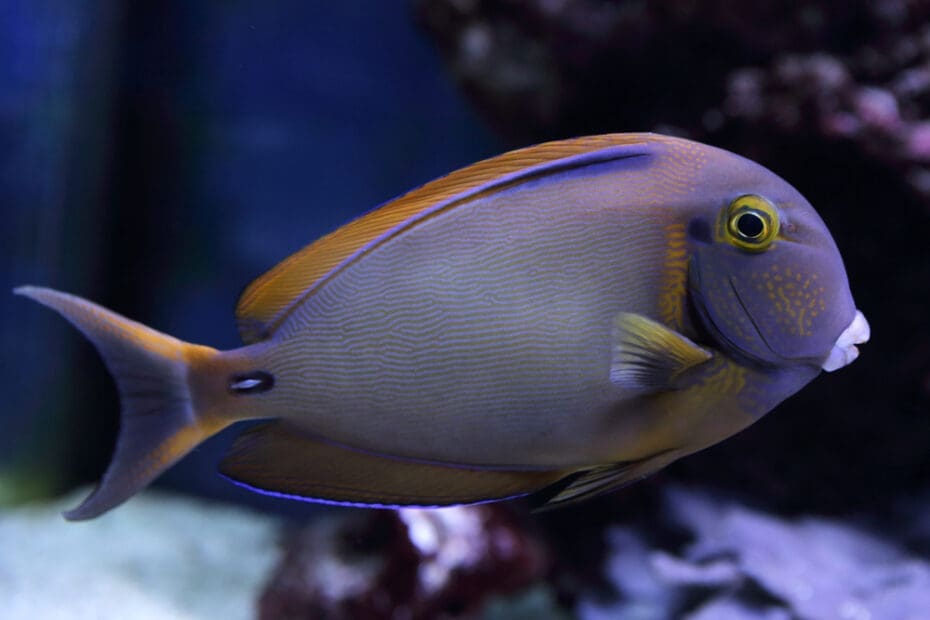Acanthurus fowleri (Fowleri Tang / Blackspine Surgeonfish)
• Small fish safe: ✅ Yes
• Small invert safe: ✅ Yes
• Coral safe: ✅ Yes
• Minimum tank size: 1,360 liters (360 gallons)
• Adult size: Up to 50 cm (20 inches)
• Diet: Primarily herbivorous; requires a diet rich in marine-based seaweed and algae
• Be aware of: Can be semi-aggressive, especially towards similar species; requires ample swimming space and a well-established aquarium with abundant live rock for grazing
Fowleri Tang (Acanthurus fowleri) – A Majestic and Active Reef Inhabitant
The Fowleri Tang, also known as the Blackspine Surgeonfish, is a large and striking member of the surgeonfish family. Its vibrant coloration and active swimming behavior make it a captivating addition to spacious marine aquariums.
Appearance and Coloration
The Fowleri Tang boasts a distinctive and colorful appearance:
• Body Color: A tan to brown body with a blue head featuring characteristic arcing lines behind the eye.
• Fins: A yellow dorsal fin and a white lyre accent on the tail.
• Tail: A lyre-shaped caudal fin with white accents.
These vibrant features make the Fowleri Tang a standout specimen in large marine aquariums.
Natural Habitat and Behavior
In the wild, Fowleri Tangs are typically found in:
• Habitat: Clear seaward reefs and drop-offs in the Western Pacific, including regions around the Philippines, Indonesia, Papua New Guinea, Solomon Islands, and northwestern Australia.
• Behavior: Active swimmers that graze on algae-covered surfaces throughout the day.
In captivity, they require ample space to swim and graze, as well as plenty of live rock to establish territories and provide grazing surfaces.
Tank Requirements and Water Parameters
Due to their size and active nature, Fowleri Tangs require a spacious and well-maintained aquarium:
• Minimum Tank Size: 1,360 liters (360 gallons)
• Temperature: 22–25.5°C (72–78°F)
• pH: 8.1–8.4
• Salinity: Specific gravity of 1.020–1.025
• Water Movement: Moderate to strong, replicating natural reef conditions
• Aquascaping: Ample live rock to create hiding spots and grazing areas, while ensuring open spaces for swimming
Maintaining high water quality and stable parameters is essential for their health and well-being.
Diet and Feeding
As herbivores, Fowleri Tangs require a diet rich in marine-based vegetation:
• Primary Diet: Marine-based seaweed and algae
• Feeding Frequency: Offer dried seaweed tied to a rock or use a veggie clip at least three times per week.
• Recommended Products: Sea Veggies, Seaweed Salad, and Ocean Nutrition are ideal options.
A diet rich in marine algae will strengthen their immune system, reduce aggression, and improve overall health.
Compatibility and Tank Mates
Fowleri Tangs are generally peaceful but can exhibit semi-aggressive behavior, especially towards similar species:
• Compatible Tank Mates: Most community saltwater fish that are non-aggressive and dissimilar in appearance
• Caution With: Other tangs or surgeonfish, especially those of similar shape or coloration, unless housed in a sufficiently large aquarium
Introducing them into a well-established tank with ample space can help mitigate territorial behaviors.
Health and Disease Considerations
Fowleri Tangs are relatively hardy but can be susceptible to common marine diseases:
• Marine Ich: Maintain optimal water quality and a nutritious diet to prevent outbreaks
• Head and Lateral Line Erosion (HLLE): Associated with poor water quality and inadequate nutrition; ensure a balanced diet and pristine conditions
Regular monitoring and maintaining optimal water conditions are essential for their well-being.
Lifespan and Long-Term Care
With proper care, Fowleri Tangs can live for several years in captivity. Their longevity is enhanced by providing a spacious environment, a balanced diet, and regular health monitoring.
Why Choose a Fowleri Tang?
• Algae Control: As natural grazers, they assist in managing algae growth within the tank
• Visual Appeal: Their distinctive coloration and active behavior make them a captivating addition to marine aquariums
• Hardiness: With proper care, they adapt well to captive environments and can thrive for many years
The Fowleri Tang is a beneficial and attractive choice for aquarists seeking both aesthetic appeal and functionality in algae management.
